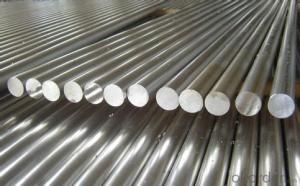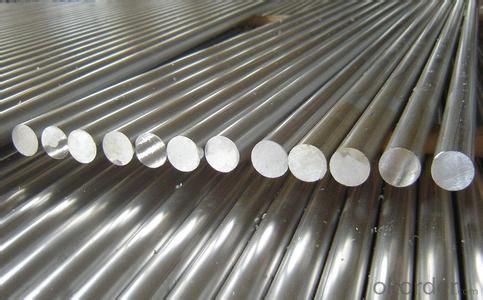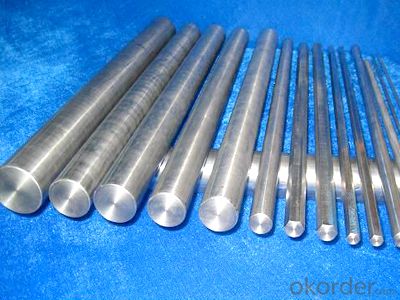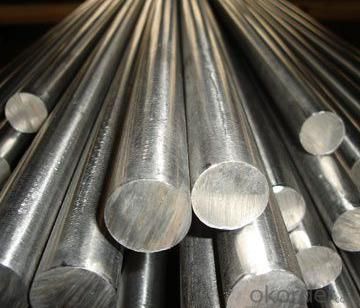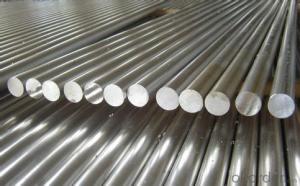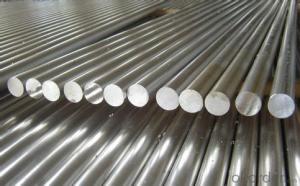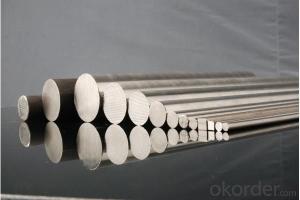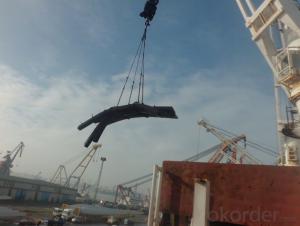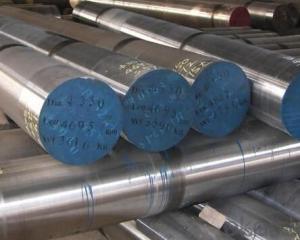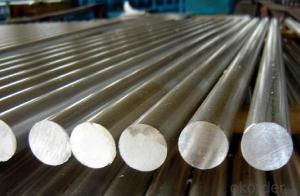Grade 316 Stainless Steel Bar Round Square Hexagonal
- Loading Port:
- Shanghai
- Payment Terms:
- TT OR LC
- Min Order Qty:
- 3 m.t.
- Supply Capability:
- 100000 m.t./month
OKorder Service Pledge
OKorder Financial Service
You Might Also Like
Specification
Grade 316 Stainless Steel Bar Round Square Hexagonal
Details Information of Grade 316 Stainless Steel Bar Round Square Hexagonal
| Name | 316 stainless steel bar |
| Shape | Round Bar/Square Bar/Flat Bar/Plate/Wire |
| Standard | GB/ASTM/SAE/AISI/DIN/JIS/EN/BS |
| Surface Treatment: | Black/Peeling/Polished/Machined |
| Delivery Condition: | Hot Rolled or Forged/Peeled or Black Surface |
| Test | SGS/UT 100% Elements Testing |
| Certificate: | ISO/Mill Certificate |
| Service: | 24 hours online service / |
| more than 20 years trading and manufacture | |
| Quality Assurance: | the third party inspection, such as SGS, BV, TUV…etc. is acceptable |
| Packaging Details: | Seaworthy Packaging or as per customer's packing instruction |
| Carbon structure round bar | Q195 Q235A Q235B 10# 20#-55# S45CB |
| Low alloy high strength round bar | Q345A/Q345C/Q345D Q345B Q345E |
| Alloy structure round bar | SAE51B20 20Cr 40Cr 40CrV 20CrMo/30CrMo/35CrMo/42CrMo 20CrMoA/30CrMoA/35CrMoA/42CrMoA/42Cr ML20CrMo/ML30CrMo/ML35CrMo/ML42CrMo B7/SCM435-440 20MnTiB 20CrMnMo 20CrMoH 42CrMoH 40MnB/40MnBH 30Mn2-40Mn2 27SiMn 50CrVA 30CrMnTi |
| Pinion steel | 20CrMnTi 20CrMnTiH 20CrMnTiHCS/20CrMnTiHLD Q20CrMnTi-1/Q20CrMnTi-2 |
| Sucker rod | 20-35CrMoA |
| Free-cutting steel | GT1215S |
| Spring steel | 60Si2MnA 65Mn |
| Ball bearing steel | GCr15 |
Chemical Composition of Grade 316 Stainless Steel Bar Round Square Hexagonal
| C | Si | Mn | P | S | Cr | Ni | Cu |
| 0.17-0.24 | 0.17-0.37 | 0.35-0.65 | ≤0.035 | ≤0.035 | ≤0.25 | ≤0.25 | ≤0.25 |
| Tensile strength (σb/MPa) | Yield strength (σb/MPa) | Elongation (δ5/%) |
| ≥410(42) | ≥245(25) | ≥25 |
Company Introduction of Grade 316 Stainless Steel Bar Round Square Hexagonal
CNBM International Corporation is the most import and export platform of CNBM group(China National Building Material Group Corporation) ,which is a state-owned enterprise, ranked in 270th of Fortune Global 500 in 2015.
With its advantages, CNBM International are mainly concentrate on Cement, Glass, Iron and Steel, Ceramics industries and devotes herself for supplying high quality series of refractories as well as technical consultancies and logistics solution.
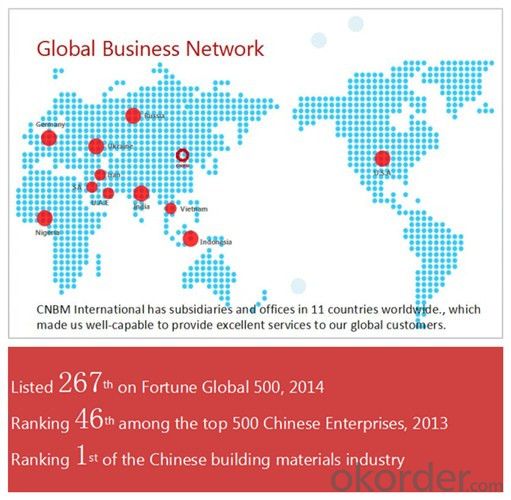
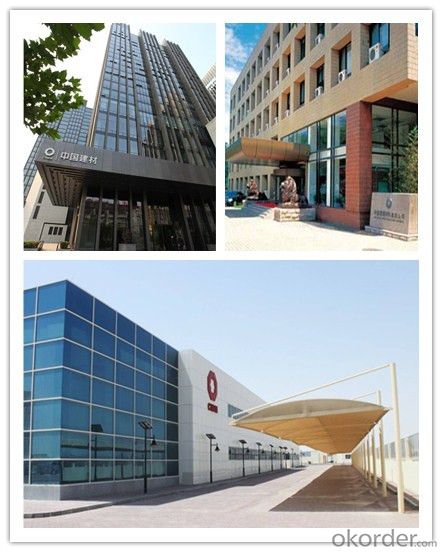
Certificates of Grade 316 Stainless Steel Bar Round Square Hexagonal
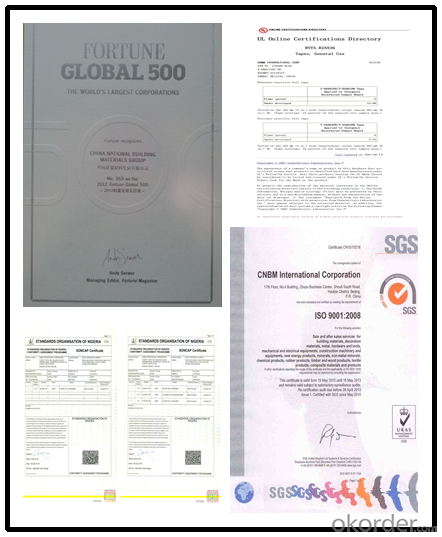
Packaging & Delivery of Grade 316 Stainless Steel Bar Round Square Hexagonal
Packaging Detail | Sea worthy packing /as per customer's packing instruction |
Delivery Detail | 15 ~ 40 days after receiving the deposit |
Products show of Grade 316 Stainless Steel Bar Round Square Hexagonal
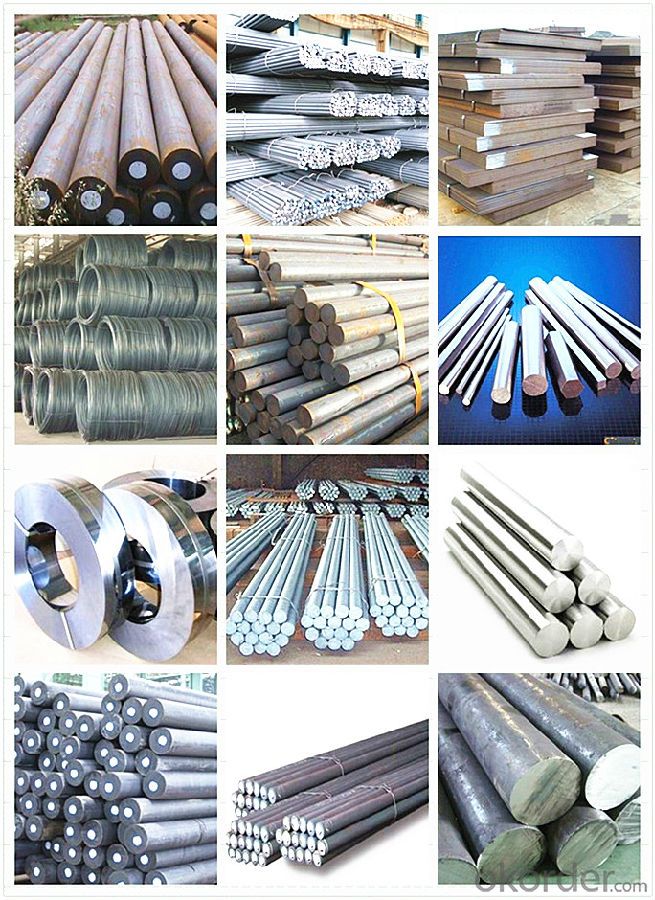
FAQ
Are you a trading company or manufacturer? | Manufacturer |
What’s the MOQ? | 3 metric ton |
What’s your delivery time? | 15-35 days after downpayment received |
Do you Accept OEM service? | Yes |
what’s your delivery terms? | FOB/CFR/CIF |
What's the Payment Terms? | 30% as deposit,70% before shipment by T/T |
Western Union acceptable for small amount. | |
L/C acceptable for large amount. | |
Scrow ,Paybal,Alipay are also ok | |
Why choose us? | Chose happens because of quality, then price, We can give you both. Additionally, we can also offer professional products inquiry, products knowledge train (for agents), smooth goods delivery, excellent customer solution proposals. |
What's your available port of Shipment? | Main Port, China |
What’s your featured services? | Our service formula: good quality+ good price+ good service=customer's trust
|
Where are your Market? | Covering more than 160 countries in the world |
- Q: What are the different methods for improving the machinability of special steel?
- To enhance the machinability of special steel, there exist various techniques that can be employed: 1. Alloying: Incorporating alloying elements into the steel is one approach. These elements aid in improving machinability by decreasing hardness and enhancing the material's ability to break chips. Common alloying elements include sulfur, lead, and selenium. 2. Heat treatment: Subjecting the steel to specific heat treatment processes is another method. For instance, annealing the steel can impart a softer texture, making it easier to machine. Likewise, tempering can enhance machinability by reducing hardness and increasing toughness. 3. Cutting fluids: The utilization of appropriate cutting fluids during machining can significantly enhance machinability. These fluids act as coolants, minimizing heat generated during cutting, lubricating the cutting tool, and consequently reducing friction while improving chip evacuation. 4. Tool selection: Selecting the correct cutting tool for the specific steel being machined is critical for improving machinability. Tools with suitable coatings, geometries, and cutting parameters can reduce cutting forces, enhance chip control, and improve overall machining efficiency. 5. Decreased cutting speeds: Lowering cutting speeds can contribute to improved machinability of special steel. This can be achieved by reducing the feed rate or spindle speed. However, it is essential to ensure that the cutting speed remains within the recommended range to avoid adverse effects on tool life and productivity. 6. Pre-machining operations: Executing pre-machining operations such as forging, extrusion, or rolling can refine the steel's microstructure, rendering it more suitable for subsequent machining processes. These operations aid in breaking down large grains, enhancing homogeneity, and reducing overall material hardness. 7. Surface treatments: Implementing surface treatments, like coatings or platings, can augment the machinability of special steel. These treatments enhance tool wear resistance, reduce friction, and promote better chip flow, ultimately leading to improved machining performance. It is important to note that the choice of method or combination of methods utilized to enhance machinability will depend on the specific type of special steel being machined, the desired outcomes, and the available resources. It is advisable to consult experts or conduct comprehensive research to determine the most appropriate approach for a particular application.
- Q: What are the requirements for special steel used in robotic applications?
- Optimal performance and reliability of robotic applications necessitates special steel that meets specific key requirements. These requirements encompass: 1. Exceptional strength: The steel utilized in robotic applications must possess outstanding strength properties to endure the stresses and loads encountered during robotic operations. It should exhibit superior tensile and yield strength to ensure structural integrity and prevent failure when subjected to heavy loads. 2. Resistance to wear: The steel employed in robotic applications should demonstrate high resistance to wear, enabling it to withstand repetitive motions, sliding, and abrasive contact with different surfaces. This characteristic minimizes wear and tear, thereby extending the lifespan of robotic components. 3. Protection against corrosion: Robotic applications often involve exposure to diverse environments, including moisture, chemicals, and other corrosive agents. Consequently, the special steel employed must possess excellent corrosion resistance to prevent degradation and maintain optimal performance over time. 4. Toughness: Good toughness is essential for special steel, allowing it to absorb energy and resist fracture or cracking. This attribute is crucial to ensure that the steel can withstand sudden shocks or impacts without catastrophic failure, thereby enhancing the safety and reliability of the robotic system. 5. Machinability: Robotic components often necessitate intricate shapes and precise dimensions. Therefore, the special steel used must exhibit good machinability, enabling easy cutting, shaping, and forming without excessive tool wear or manufacturing difficulties. 6. Heat resistance: Some robotic applications involve exposure to high temperatures, such as in welding or metalworking processes. Hence, it is imperative for the special steel to possess good heat resistance, maintaining its mechanical properties and structural integrity even under elevated temperatures. 7. Magnetic properties: Certain robotic applications may require non-magnetic steel to prevent interference with electromagnetic sensors or systems. Consequently, special steel with low magnetic permeability is often preferred for such applications. By fulfilling these requirements, special steel employed in robotic applications can deliver the necessary strength, durability, and performance essential for efficient and reliable robotic operations across various industries, including manufacturing, healthcare, and exploration.
- Q: What are the properties of wear-resistant stainless steel?
- Wear-resistant stainless steel possesses properties such as high hardness, excellent corrosion resistance, and good toughness. It is designed to withstand abrasion, erosion, and wear caused by friction, making it ideal for applications where durability and long-lasting performance are crucial, such as in industrial machinery, cutting tools, and automotive components.
- Q: What are the different heat treatment processes used in special steel?
- There are several heat treatment processes used in special steel, including annealing, normalizing, quenching, tempering, and precipitation hardening. Annealing involves heating the steel to a high temperature and then slowly cooling it, which helps to relieve internal stresses and improve its ductility. Normalizing is similar to annealing, but the cooling process is done in still air, resulting in a more uniform grain structure. Quenching involves rapidly cooling the steel in a liquid, such as water or oil, to achieve high hardness and strength. Tempering is a process that follows quenching, where the steel is reheated to a specific temperature and then cooled, which reduces the brittleness and improves toughness. Lastly, precipitation hardening involves heating the steel to a high temperature and then cooling it quickly to form fine precipitates that enhance its strength.
- Q: What are the different forging techniques for special steel?
- For special steel, different forging techniques can be utilized depending on the desired properties and characteristics of the final product. Some commonly employed techniques are as follows: 1. Open-die forging, also known as smith forging or hand forging, involves shaping the steel between two flat dies or anvils. The metal is heated and hammered repeatedly until it achieves the desired shape. This technique is suitable for larger and more intricate components like shafts, cylinders, or discs. 2. Closed-die forging, also called impression-die forging, entails shaping the steel within a set of dies that contain the desired shape. The metal is placed between the dies and compressed under high pressure. Closed-die forging is often used for smaller, more intricate components, providing greater control over the final shape and dimensions. 3. Roll forging involves passing the steel between two or more rotating rolls to shape it. The rolls exert pressure on the metal, causing it to deform and acquire the desired shape. This technique is commonly used for producing long, cylindrical components such as axles, bars, or rings. 4. Upset forging involves deforming the steel by reducing its length and increasing its cross-sectional area. The metal is placed between two dies and axially compressed, resulting in bulging and the desired shape. Upset forging is commonly utilized for producing short, thick components like bolts, screws, or nuts. 5. Press forging, similar to closed-die forging, employs a hydraulic or mechanical press to shape the steel. The metal is placed between two dies and compressed under high pressure, allowing controlled deformation. Press forging enables precise control over the shaping process and is often employed for producing high-quality and complex components. Each of these forging techniques possesses its own advantages and limitations, and the choice of technique relies on factors such as size, complexity, and desired properties of the final product. By selecting the appropriate forging technique, manufacturers can ensure that special steel components meet the required specifications and performance standards.
- Q: What are the specific requirements for special steel used in the chemical industry?
- Special steel used in the chemical industry must meet specific requirements in order to ensure optimal performance and safety. Some of the key requirements for special steel in the chemical industry include: 1. Corrosion resistance: Special steel used in the chemical industry must possess high resistance to corrosion, as it will be exposed to various aggressive chemicals and corrosive environments. This means that the steel should be able to withstand the corrosive effects of acids, alkalis, and other chemicals commonly used in the industry. 2. High temperature resistance: The steel should have excellent heat resistance to withstand high operating temperatures often encountered in chemical processes. This is important to ensure that the steel does not degrade or lose its strength when exposed to elevated temperatures. 3. Mechanical strength: Special steel used in the chemical industry should have superior mechanical strength to withstand the high stress and pressure that can occur during chemical processes. It should be able to maintain its structural integrity even under challenging conditions. 4. Resistance to fatigue and stress: The steel should have good resistance to fatigue and stress, as it will be subjected to cyclic loading and pressure variations during operation. This is crucial to ensure the longevity and reliability of the steel in the chemical industry. 5. Resistance to pitting and crevice corrosion: Special steel should be resistant to pitting and crevice corrosion, which can occur in areas of the steel that are exposed to stagnant or low-velocity corrosive media. Pitting and crevice corrosion can lead to localized damage and failure of the steel, so resistance to these types of corrosion is essential. 6. Low impurity content: Special steel used in the chemical industry should have low impurity content to minimize the risk of contamination of the chemicals being processed. Impurities can react with the chemicals or cause unwanted reactions, potentially leading to product quality issues or safety hazards. 7. Easy cleanability: The steel should have a smooth surface and be easily cleanable to prevent the buildup of contaminants or fouling. This is important to maintain the purity of the chemicals being processed and to ensure efficient operation of the equipment. Meeting these specific requirements ensures that special steel used in the chemical industry can withstand the harsh conditions and corrosive environments encountered, while maintaining its structural integrity, performance, and safety.
- Q: What are the different types of spring steel?
- There are several different types of spring steel, including high-carbon spring steel, alloy spring steel, stainless steel, and music wire.
- Q: What are the main applications of special steel in the medical field?
- Special steel is widely used in the medical field for various applications. Some of the main applications include surgical instruments, implants, and medical devices. Surgical instruments such as forceps, scalpels, and scissors are often made from special steel due to its high strength, durability, and corrosion resistance. Implants, such as joint replacements and dental implants, are commonly made from special steel alloys that provide strength, biocompatibility, and resistance to wear and tear. Additionally, special steel is used in the production of medical devices like needles, catheters, and stents, where its properties contribute to their effectiveness and safety.
- Q: How does special steel contribute to the aerospace fastener industry?
- Special steel contributes to the aerospace fastener industry by offering enhanced strength, durability, and resistance to extreme temperatures and corrosion. These properties make it a crucial material for manufacturing aerospace fasteners, which are essential for holding aircraft structures together. The high-performance nature of special steel ensures the reliability and safety of fasteners, ultimately contributing to the overall efficiency and success of the aerospace industry.
- Q: What are the different non-destructive testing techniques used for special steel?
- There are several non-destructive testing (NDT) techniques that are commonly used for special steel to ensure its quality and integrity without causing any damage. These techniques are essential in industries where special steel is used, such as aerospace, automotive, and construction, to ensure that the material meets the required specifications and standards. Some of the commonly used NDT techniques for special steel are: 1. Ultrasonic Testing (UT): This technique involves the use of high-frequency sound waves to detect internal flaws, such as cracks, voids, or inclusions, in special steel. UT is highly effective in detecting subsurface defects and is widely used due to its versatility and accuracy. 2. Magnetic Particle Testing (MT): MT is a technique that uses magnetic fields and iron particles to detect surface or near-surface defects in special steel. It is particularly useful in identifying defects like cracks, seams, or laps, as the magnetic particles will accumulate at these locations, making them visible under proper lighting conditions. 3. Liquid Penetrant Testing (PT): PT is a widely-used method for detecting surface defects in special steel. It involves applying a liquid penetrant to the surface of the material, which seeps into any surface cracks or defects. After a specified time, the excess penetrant is removed, and a developer is applied to make the defects visible. 4. Eddy Current Testing (ET): ET utilizes electromagnetic induction to detect surface or near-surface defects in special steel. It is particularly useful in detecting cracks, corrosion, or metal loss in conductive materials. ET is a fast and accurate method, making it suitable for high-speed production environments. 5. Radiographic Testing (RT): RT involves the use of X-rays or gamma rays to examine the internal structure of special steel. It can detect various defects, including porosity, inclusions, and cracks. RT provides detailed images that help identify the location, size, and severity of defects. 6. Visual Testing (VT): VT is a simple yet crucial technique that involves a visual examination of the surface of special steel. It helps identify surface defects like scratches, dents, or corrosion. Although VT is not as sensitive as other NDT techniques, it is often used as a preliminary inspection method. Each of these non-destructive testing techniques has its own advantages and limitations. The selection of the appropriate technique depends on factors such as the type and size of the special steel, the required inspection depth, and the specific defects that need to be detected. By using a combination of these techniques, manufacturers and inspectors can ensure the quality and reliability of special steel products.
Send your message to us
Grade 316 Stainless Steel Bar Round Square Hexagonal
- Loading Port:
- Shanghai
- Payment Terms:
- TT OR LC
- Min Order Qty:
- 3 m.t.
- Supply Capability:
- 100000 m.t./month
OKorder Service Pledge
OKorder Financial Service
Similar products
Hot products
Hot Searches
Related keywords
